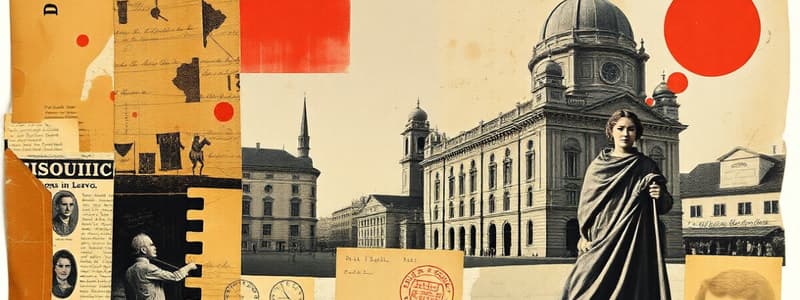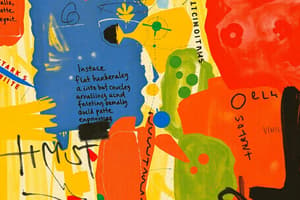Podcast
Questions and Answers
What is a primary source in historical study?
What is a primary source in historical study?
- A documentary film about an event
- A firsthand account of a historical event (correct)
- An analysis of a historical event by a historian
- A collection of artifacts from a museum
Why is chronology important in history?
Why is chronology important in history?
- It facilitates understanding of cause-and-effect relationships among events (correct)
- It helps to categorize events by their geographical locations
- It lists all historical figures in chronological order
- It focuses solely on the dates of major events
What is the significance of studying historical context?
What is the significance of studying historical context?
- It helps in analyzing the authenticity of primary sources
- It provides a singular narrative of events
- It enhances understanding of the social, economic, cultural, and political circumstances surrounding an event (correct)
- It is only useful for understanding modern history
How do historians' interpretations of events differ?
How do historians' interpretations of events differ?
What role do major wars play in history?
What role do major wars play in history?
What can be learned from studying past conflicts?
What can be learned from studying past conflicts?
How do historical studies influence education?
How do historical studies influence education?
What is a characteristic of secondary sources?
What is a characteristic of secondary sources?
Flashcards
Primary Source
Primary Source
Firsthand account of a historical event.
Secondary Source
Secondary Source
Analysis of a historical event by someone else.
Historical Methodology
Historical Methodology
Methods historians use to research and understand the past.
Historical Context
Historical Context
Signup and view all the flashcards
Historical Interpretation
Historical Interpretation
Signup and view all the flashcards
Historical Significance
Historical Significance
Signup and view all the flashcards
Historical Periods
Historical Periods
Signup and view all the flashcards
Historical Figure
Historical Figure
Signup and view all the flashcards
Study Notes
Historical Periods
- History encompasses the events, experiences, and activities of humankind throughout time.
- It involves the study of past people, societies, and events to understand how they influenced the present.
- Key aspects of historical study are primary and secondary sources. Primary sources are firsthand accounts of a historical event, while secondary sources are analyses of those events by others.
- Historical periods are often categorized by significant events, developments, or trends.
- Eras like the Paleolithic, Neolithic, Bronze Age, and Iron Age represent major advancements in human technology and organization.
- The rise and fall of empires, major wars, and revolutionary movements are all events significant in shaping the course of history.
- Chronology is crucial to understanding historical sequences and cause-and-effect relationships among events.
Historical Methodology
- Historians use a variety of methodologies to approach their research.
- Critical analysis of sources is essential to assess their authenticity, biases, and reliability.
- Primary sources, like letters, diaries, or artifacts, provide direct insights into the past.
- Secondary sources, such as scholarly articles or books, interpret and analyze primary sources to offer broader perspectives.
- Historical context, including social, economic, cultural, and political circumstances, is critical for understanding events.
- Historical interpretation is subjective. Different historians may interpret the same event in varying ways, based on their perspective and methodologies.
Historical Significance
- Histories offer valuable insights into human nature, societies, and the development of ideas, institutions, and cultures.
- Understanding the past aids in understanding the present and predicting future trends.
- Studying past conflicts and mistakes can prevent similar outcomes in the future.
- Historical accounts can foster empathy and understanding across different cultures and time periods.
- Historical studies are crucial for the education process because they shape perspectives on the human condition and social development.
- The study of history helps us understand the present in relation to the past, and aids in evaluating societal progress.
Historical Figures and Events
- Important figures in history played critical roles in shaping societies and cultures.
- Major historical events, such as revolutions, wars, and significant discoveries, have impacted civilizations throughout time.
- Examining figures and events allows for a deeper understanding of human experiences, motivations, and progress.
- Studying history allows us to learn from mistakes and adapt strategies or approaches for future actions.
- Historians look for relationships and causes & effects throughout history. Historical periods overlap and events influence one another.
Studying That Suits You
Use AI to generate personalized quizzes and flashcards to suit your learning preferences.




